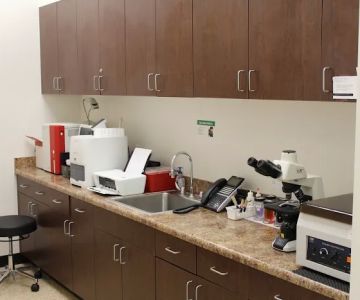Can I Be a Veterinarian if I Suck at Chemistry?
- Understanding the Role of a Veterinarian
- Why Chemistry is Important for Veterinarians
- How to Overcome Challenges in Chemistry as a Future Veterinarian
- Exploring Alternative Pathways to Becoming a Veterinarian
- Real-Life Examples of Veterinarians Who Struggled with Chemistry
- Tips for Succeeding in Veterinary School Despite Struggling with Chemistry
- Final Thoughts: Is It Possible to Become a Veterinarian with Chemistry Struggles?
Understanding the Role of a Veterinarian
Becoming a veterinarian is a dream for many animal lovers. The idea of being able to diagnose and treat animals, working in a field that combines passion for animals with science, is both rewarding and fulfilling. However, for many aspiring veterinarians, the journey to achieving this goal can seem daunting—especially if they struggle with certain subjects like chemistry. If you're asking, "Can I be a veterinarian if I suck at chemistry?" you're not alone. This is a common concern, but the answer may not be as simple as a "yes" or "no." In this article, we’ll explore why chemistry is essential for veterinarians, whether it's possible to pursue a veterinary career without excelling in chemistry, and how you can overcome these challenges to still follow your passion.
Why Chemistry is Important for Veterinarians
Chemistry plays a significant role in veterinary medicine, as it is foundational to understanding how medications work, how the body processes drugs, and how different substances interact with each other. As a veterinarian, you need to know how different chemical compounds affect animals, whether you’re administering anesthetics for surgery, prescribing medications for infections, or dealing with the biochemical processes of animal physiology. For example, veterinary pharmacology is a subject that directly relies on chemistry, as it involves the study of how drugs work within the body, their chemical composition, dosages, and potential side effects.
Additionally, understanding chemistry is crucial when diagnosing and treating diseases. Many veterinary diseases have a biochemical component, meaning that veterinarians need to understand the chemical balance in an animal's body. For example, an imbalance in electrolytes or blood glucose levels can indicate a serious health problem, and only a strong understanding of chemistry can allow veterinarians to make informed decisions in these cases. If you're struggling with chemistry, it's helpful to think about how essential this knowledge will be for the success of your future practice and your ability to provide the best care for animals.
How to Overcome Challenges in Chemistry as a Future Veterinarian
While chemistry is a significant part of veterinary education, struggling with it doesn’t mean that you can’t become a successful veterinarian. Many students face challenges in chemistry, especially in the early stages of their education. However, there are strategies to help you overcome these difficulties. First and foremost, understanding that you are not alone in facing chemistry struggles is crucial. Many aspiring veterinarians have overcome their struggles with chemistry by dedicating extra time, seeking help, and staying persistent.
One of the best ways to succeed in chemistry is to take a proactive approach. Start by seeking additional help outside of class. Many universities offer tutoring programs, and there are online resources available to help you master complex topics. For example, websites like Khan Academy and YouTube have free videos that break down chemistry concepts in a more understandable way. It can also be beneficial to study with classmates or join study groups, as they can provide different perspectives and explanations that might make complex ideas click.
Another strategy is to break down chemistry into smaller, more manageable sections. Instead of trying to understand an entire chapter at once, focus on learning one concept at a time and build upon your knowledge. Gradually, you’ll find that these smaller pieces start to fit together, and the overall picture becomes clearer. With consistent effort, chemistry can become less overwhelming and more manageable.
Exploring Alternative Pathways to Becoming a Veterinarian
If chemistry continues to be a challenge, it’s essential to remember that there are various pathways to a veterinary career. Veterinary schools generally require a certain level of chemistry knowledge, but there are different ways to approach this requirement. Some students may opt to pursue a pre-veterinary track at a college that offers specialized support for those struggling with chemistry. These programs often provide more hands-on experience and can allow students to focus on building a solid foundation in the basic sciences without feeling overwhelmed.
In addition, some veterinary schools offer programs or accommodations that are designed to support students who face difficulties in specific subjects like chemistry. It’s a good idea to research veterinary schools that offer academic support or consider reaching out to admissions teams to discuss your concerns. Some schools may allow students to take supplementary courses or offer additional tutoring services to help ensure their success. You might also consider a gap year or enrolling in a preparatory program that focuses on strengthening your chemistry knowledge before applying to veterinary school.
Real-Life Examples of Veterinarians Who Struggled with Chemistry
Many successful veterinarians have struggled with chemistry at some point in their academic journey. For example, Dr. Sarah, a veterinarian practicing in California, openly shares her story of how she struggled with chemistry during her undergraduate years. Despite her difficulties, Dr. Sarah stayed persistent, sought tutoring, and ultimately gained a deep understanding of the subject. She credits her persistence with allowing her to succeed in veterinary school and become a successful professional in the field. Her story is a reminder that overcoming academic challenges is possible with dedication and support.
Similarly, Dr. James, a veterinarian in Texas, struggled with chemistry but found success by focusing on real-world applications of the subject. He took an alternative route by working in an animal shelter for a year, gaining practical experience and applying chemistry concepts in a hands-on environment. His story shows that, while chemistry is important, it’s not the only factor that determines your success as a veterinarian. Passion for animals, perseverance, and practical experience can all contribute to a rewarding career.
Tips for Succeeding in Veterinary School Despite Struggling with Chemistry
If you’re struggling with chemistry but still want to pursue a career as a veterinarian, there are several strategies you can use to improve your chances of success. First, take a proactive approach to learning by breaking down chemistry concepts into smaller pieces and seeking help whenever needed. Don’t hesitate to reach out to professors or tutors for additional support. Additionally, try to gain hands-on experience working with animals, as this will help you build the practical skills necessary to succeed as a veterinarian. While chemistry is important, real-world experience can be equally valuable in your development as a future veterinarian.
Another tip is to stay organized and plan ahead. Veterinary school can be intense, and time management is key to balancing chemistry coursework with other subjects. Create a study schedule that allows you to allocate enough time for chemistry while still focusing on other important areas of your education. Consistency and discipline will help you stay on track and reduce feelings of overwhelm.
Final Thoughts: Is It Possible to Become a Veterinarian with Chemistry Struggles?
In conclusion, while chemistry is a significant part of veterinary education, struggling with the subject does not mean you cannot achieve your dream of becoming a veterinarian. Many successful veterinarians have faced challenges with chemistry and overcome them with persistence, dedication, and a willingness to seek help. By taking proactive steps, exploring alternative pathways, and gaining practical experience, you can still pursue your passion for animals and succeed in veterinary school. If you’re determined to become a veterinarian, remember that your hard work, passion, and perseverance can carry you through any academic challenge.











